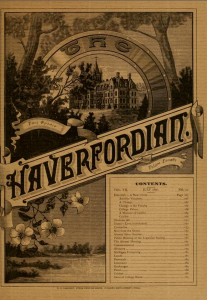The societies collaborated to produce The Haverfordian, a periodical which comments on daily campus life, reports on national events, especially those related to the state of Quaker education, … a space for the critical voices of students. In fact, in one Haverfordian exchange, the editors critiques Earlham’s student publication (a fellow Quaker College) as too full of “essays on psychological, philosophical and religious subjects by the professors and other learned friends of the college. These articles have their place, but never in a college journal, which is supposed to be, and in nearly every case is, the exponent of the literary thought of the students themselves.”Students also took on leadership roles that shaped the publication. For example, in 1885, Rufus M. Jones was the editor and students from each literary society were on the editorial board.
Previous: A Public Forum



